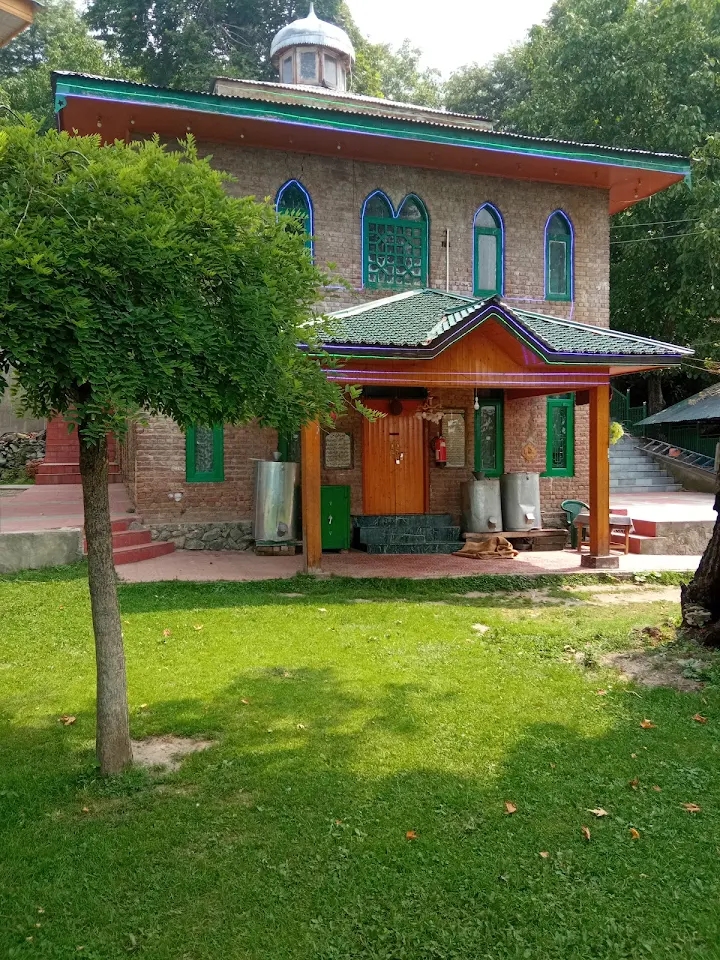
The Muslim Rishi movement shares much with its pre-Islamic counterpart in terms of certain beliefs, practices, and techniques. Both upheld the belief that ‘knowledge of God’ (Ma’rifat-e-Haqiqi) could be had through true ‘knowledge of the self’ (Ma’rfiat-e-Nafs). Like the pre-Islamic Rishis, Muslim Rishis, too, adopted stern austerities and often retired to the mountains and caves to meditate. This shift from a concern with individual salvation that could easily transform itself into a form of escapism to a concern with the welfare of ordinary people is one of the distinctive features of the Rishi order.
Baba Daryidin RA was one of the prominent and high-ranked saints of this Reshi order who lived during the reign of Zain-Ul- Abideen Badshah. This iconic Reshi saint came under the influence of two pious and known personalities of Reshi lineage viz. Nund-Reshi (Shaikh-ul-Alam) RA and Hazrat Zainudin Reshi RA. It is believed that Shaikh-ul-Alam RA entrusted Baba Daryidin RA to his Caliph- Hazrat Zainudin Reshi RA for spiritual guidance. After attaining true perfection in the world of spirituality, he was ordered by his mentor to conduct an extended visit to the valley of Kashmir; disseminate the message of oneness (Tawheed) to the general public. He acted upon the advice of his mentor and started his spiritual journey. While traveling from one area to another, he finally reached to Elaqi-Phag. There, he met with another Sufi saint of his time namely Baba Faqru-Din Wali RA who was meditating in a cave at the mountain top which is situated between Nagbal and Khalimula, tehsil Ganderbal. And the name of the village is attributed to this glorious personality as “Dariya Din” which is 10 km. away from district headquarter Ganderbal. After spending quite some time in and around this particular area, he finally selected the same place as the permanent place for his mediation. It is said that his place of meditation was surrounded by wild animals like bears, lions, snakes, etc but they never did any harmful act against him.

Histories who had penned down the biographical sketches of various Sufi saints of Kashmir like Mohammad Azim Dedmari RA, Hassan Shah Khuhami RA, Sheikul Islam Hazrat Baba Dawood Mushkati RA did mention of his name with a brief life sketch in their writings. There is no as such any written record that endorsed his exact date of birth or birthplace but as per the verbal tradition, he was from Rainawari-Srinagar. He had no formal education. Like other Muslim Rishis, he strictly adhered to the Reshi principles, led an extremely simple, single life, remain forever engrossed in the remembrance of Almighty Allah (Zikr-Allah), subjecting himself to considerable hardship and at the same time he facilitated those who were in need. So far his day-to-day needs, he was surviving on just water and dry wild edibles like leaves of Dandelion flower (Haand), Dipsacaceous leaves (Wopul Haak). Like his predecessors, he never stored any foodstuff for himself for the next day.
Apart from that, he also enjoyed the company of contemporary Rishis like Baba-Shukur-Din Reshi RA, Baba Payam-Ul-Din RA, Baba Hanif-Ul-Din Reshi, and Sheikh Sham-Ul-Din Reshi RA.
There are many miracles attributed to his life. One of the popular miracles is: “Once he was busy in meditation just a few yards away from his cave, a few buglers looted his utensils, from the Cave. Just a day after those group of looters lost their eyesight and when they came to know that the things that they had looted were the assets of the saint, they returned the martial, begged before him. Hazrat raised his hands for special prayer and their eyesight returned”.
His disciples that include prominent figures like Baba Sangee Reshi RA, Baba Fatha Reshi RA Baba-Hasti Reshi RA used to fetch water for his day-to-day needs and ablution from nearby villages because there was no water facility available there. One day, they brought that matter to his Master who recited the name Allah and then struck his hand with stick (Asa) on the ground and water oozed from there. That sources of water became the lifeline for the later residents who made this place as their permanent settlement.
During the final stage of his worldly life, he went for forty days seclusion in the cave leaving the instruction to his followers that they wouldn’t disturb him because he got the divine order to go for that special prayer. After the due date, when they removed the front stone of the cave, his body was disappeared from there. That news spread like a world fire and the people across the valley rushed there. When that news touched the ears of then Emperor- Zain-Ul-Abideen Bud Shah, he visited there along with his ministerial staff. He issued an immediate order to construct a Mausoleum at the cave and mosque there. He also donated a few kanals of land in favor of the Ziarat Sharief. One can see an awesome view of Dal- Lake from there.

Every year, the day and night annual celebration is being celebrated on 10th Rabil-Awwal that extends up to 12th Rabil Awal- the same day marks the birth anniversary of the Prophet Muhammad (SAW). People from district Ganderbal and the adjoin districts visit the shrine, special prayers are organized to give tribute to the great saint. A Community kitchen/langar is set for devotees. Locals prepared traditional dishes especially Dipsacaceous leaves (Wopul Haak) to commemorate the simple lifestyle of Reshee’s. Special thanks to Farooq Ahamad Reshee-Imam Jamia Masjid Babadriydin and Mohammad Akram Chopan-caretaker of the Shrine who facilitated me during my research work.
Inspired by Nisar Ahamad Bhat from Tulmula, Ganderbal.
Haroon Rashid Bhat is a teacher by profession, presently posted in district Ganderbal, can be reached at minamharoon123@gmail.com
Article is published @ http://www.kashmirpen.in/baba-dariya-din-ra-the-sufi-saint-of-rishi-order/amp/
